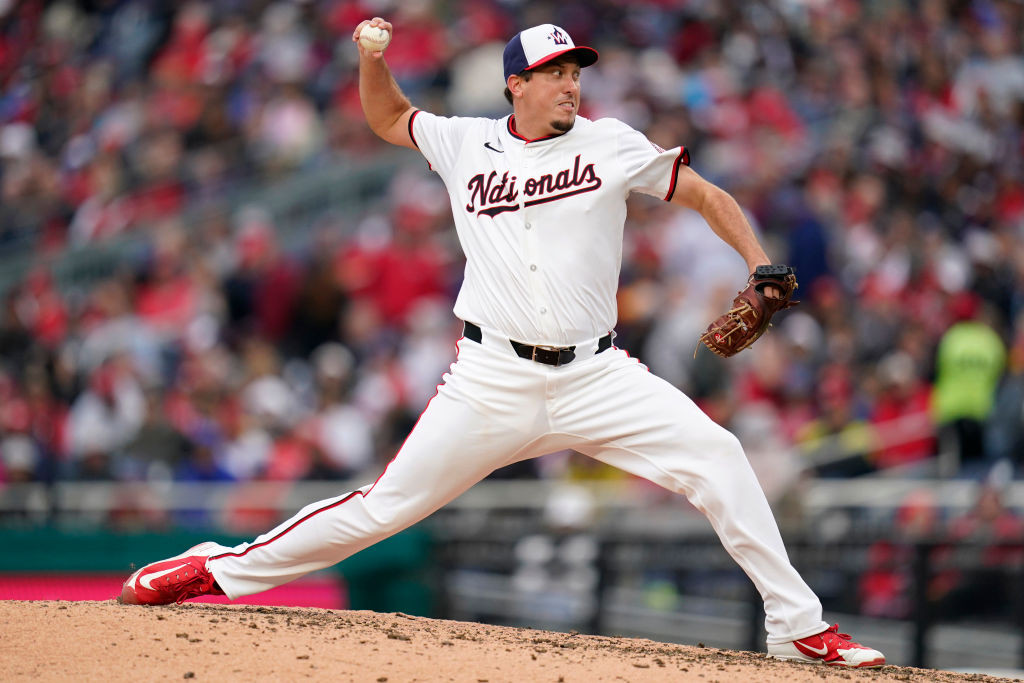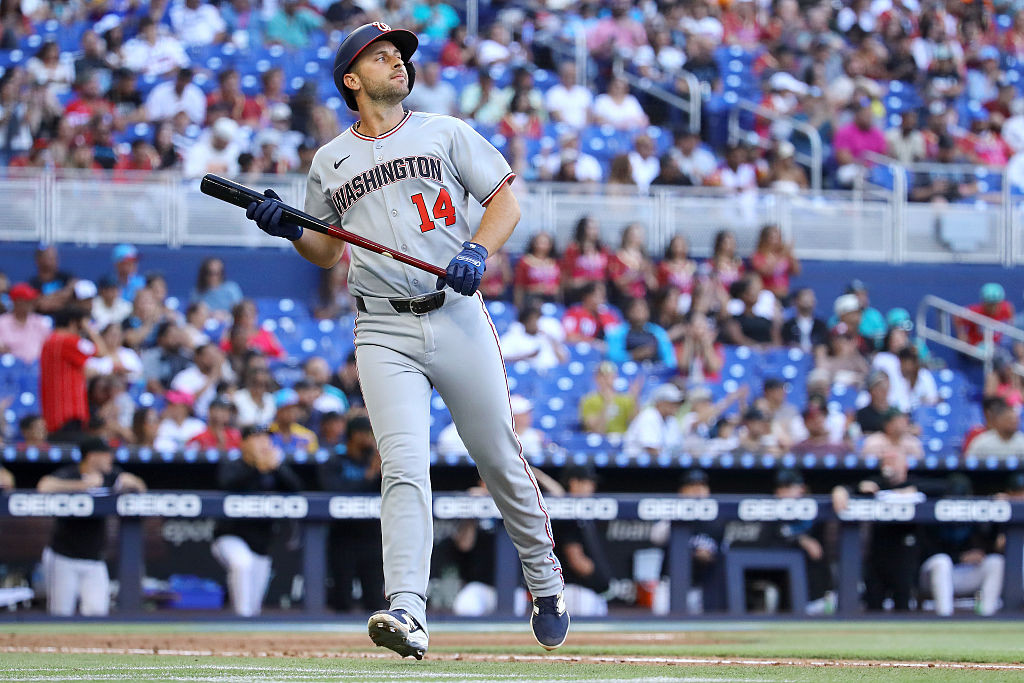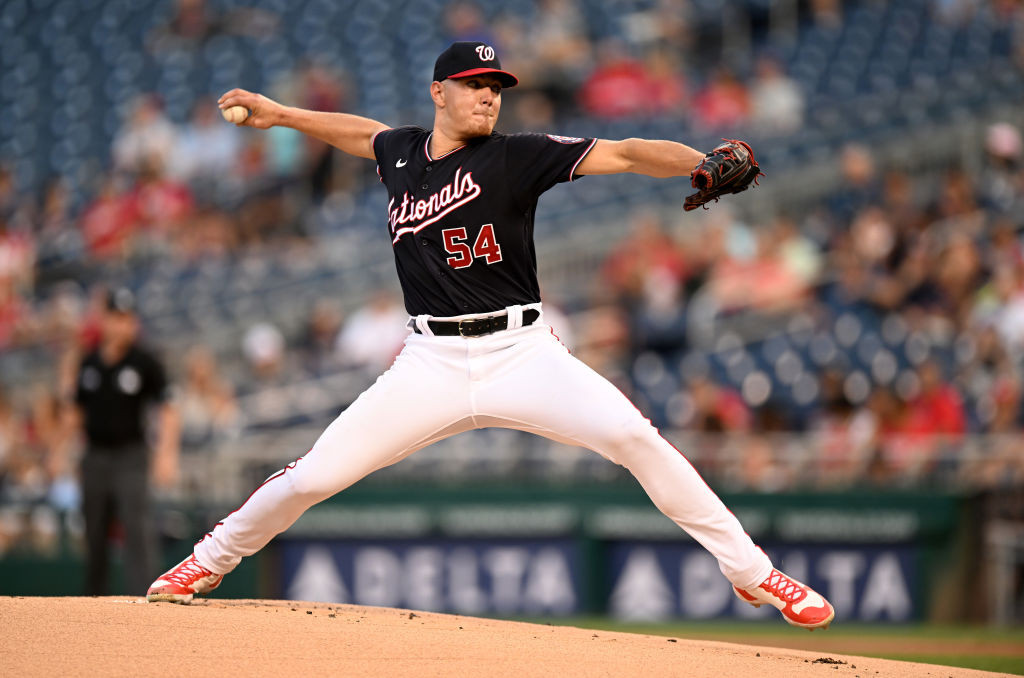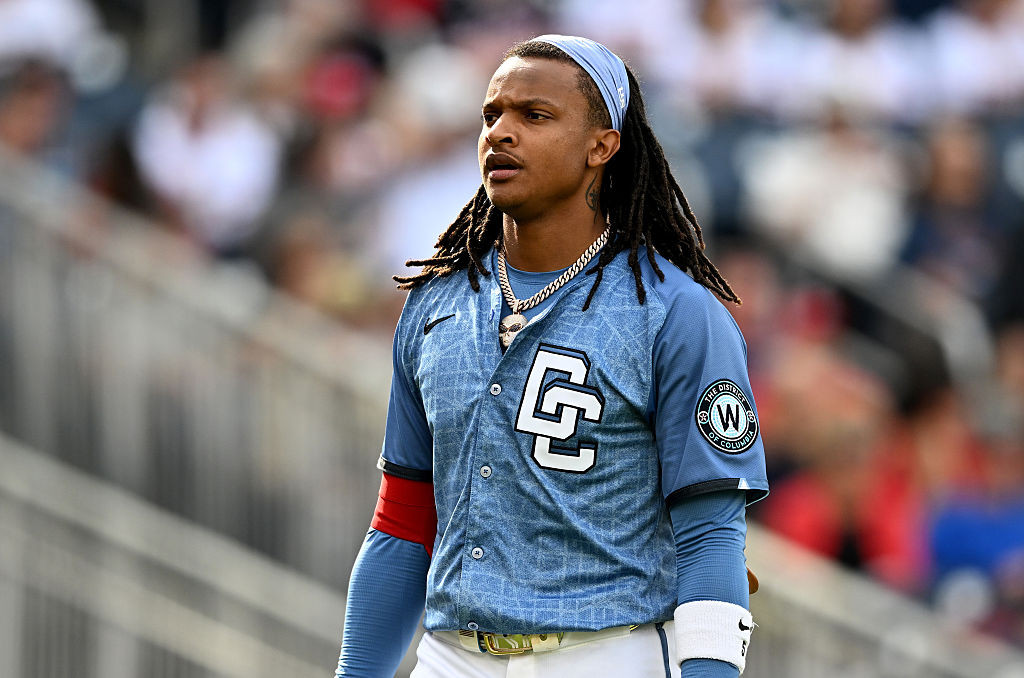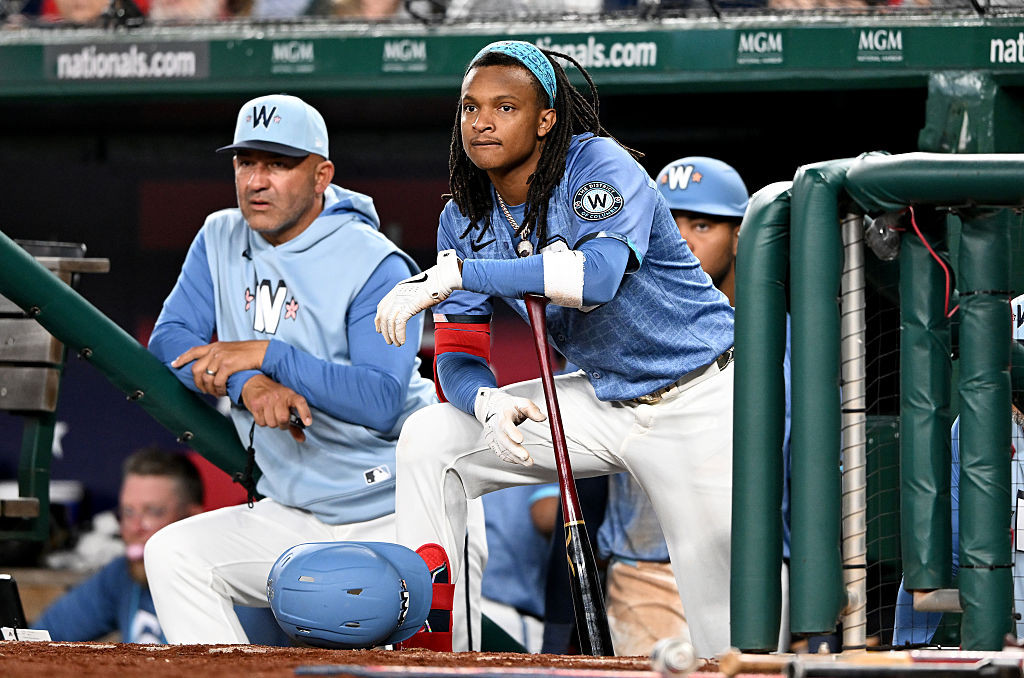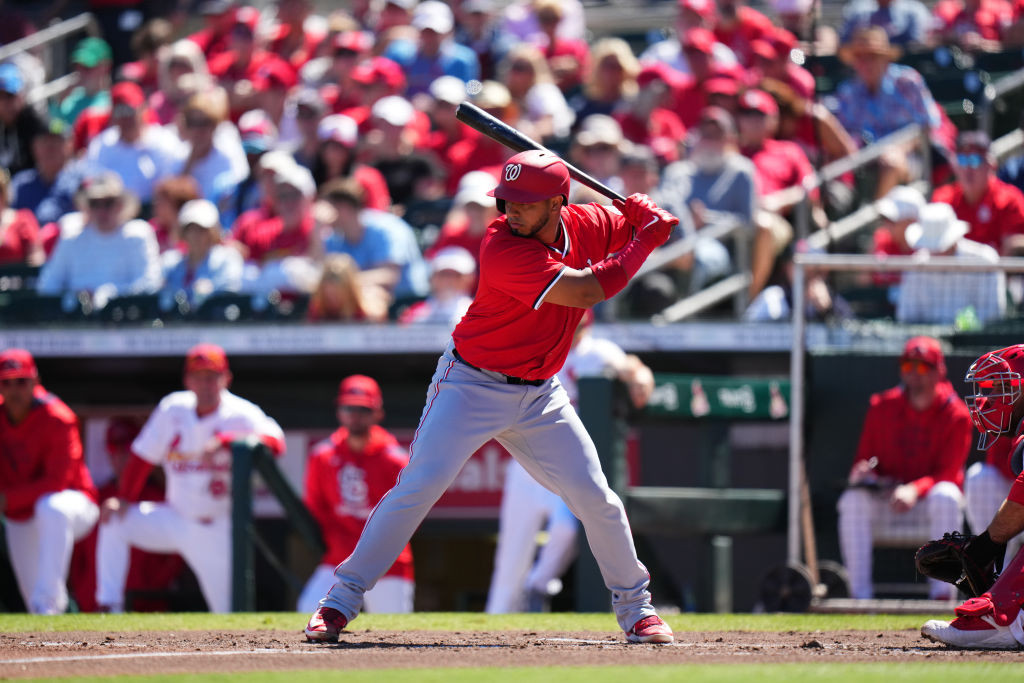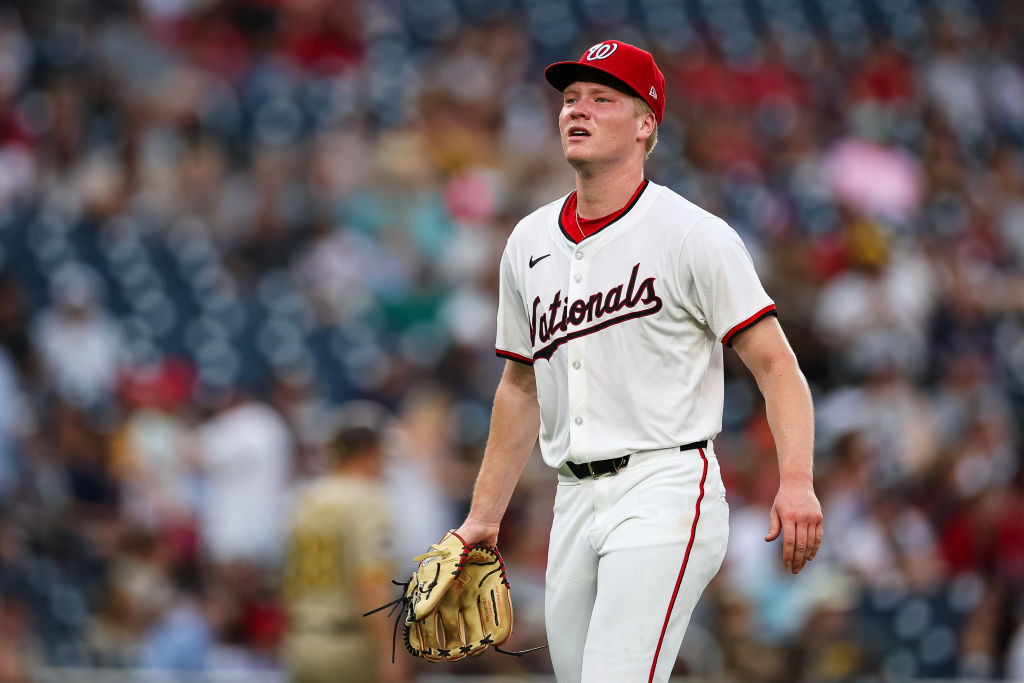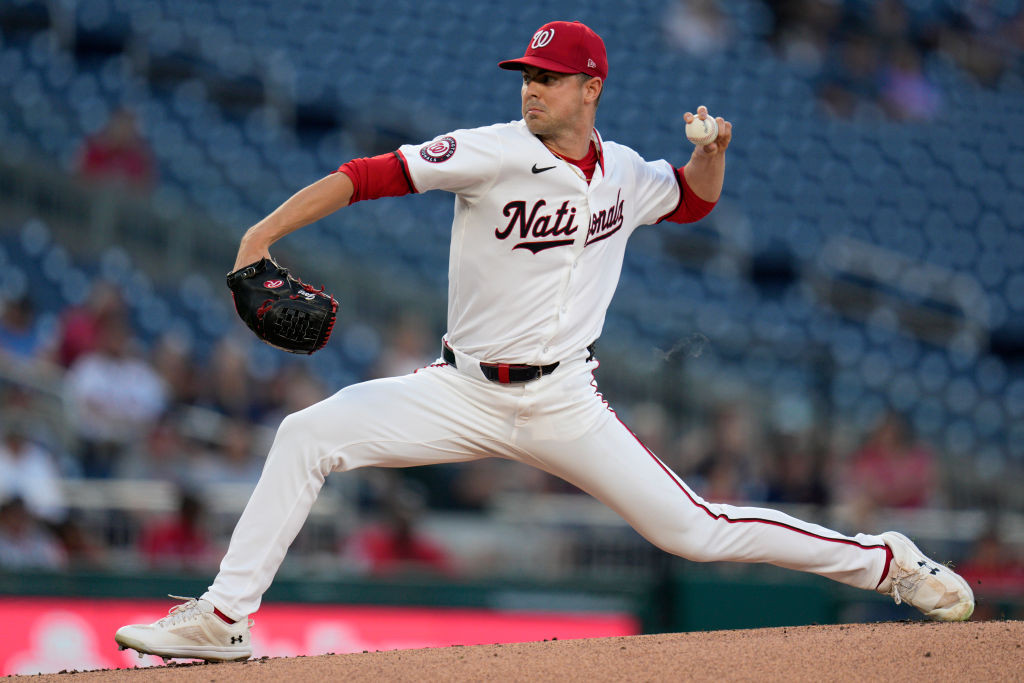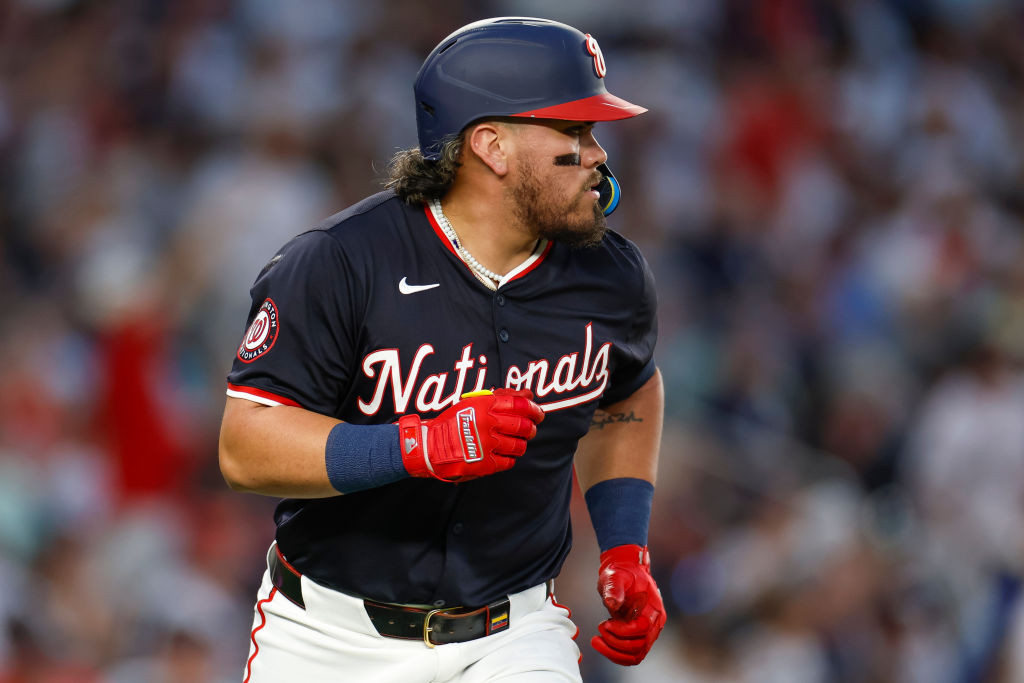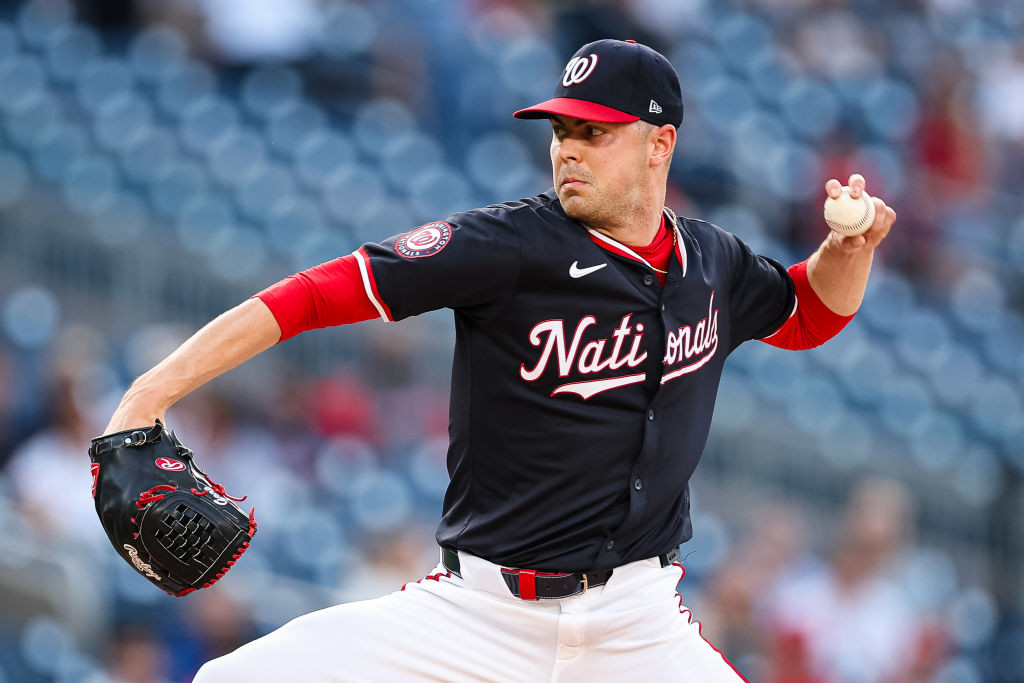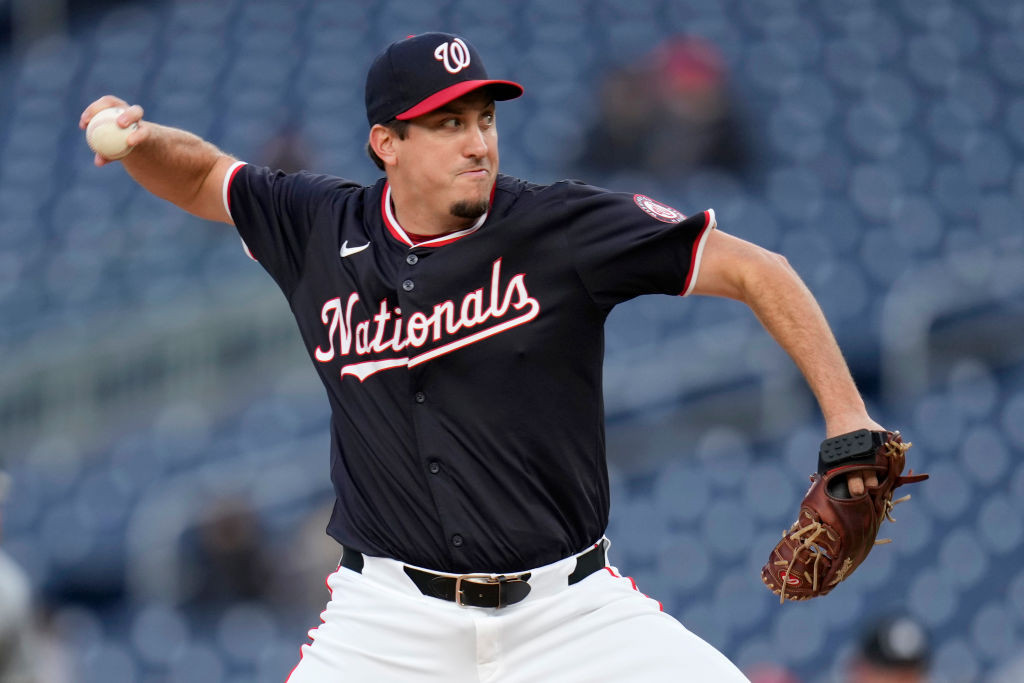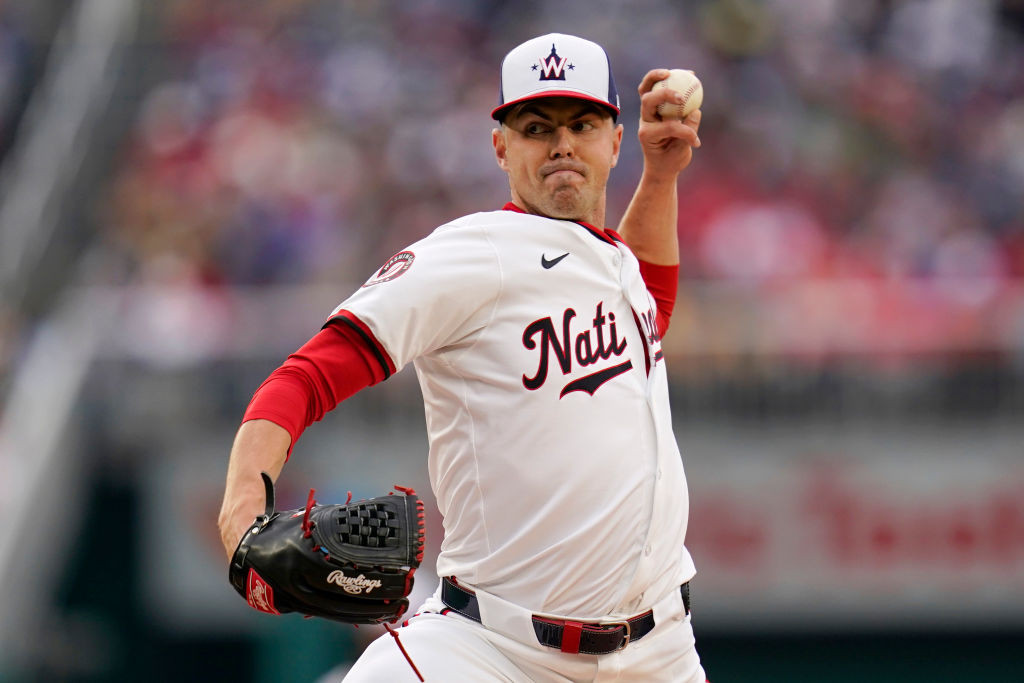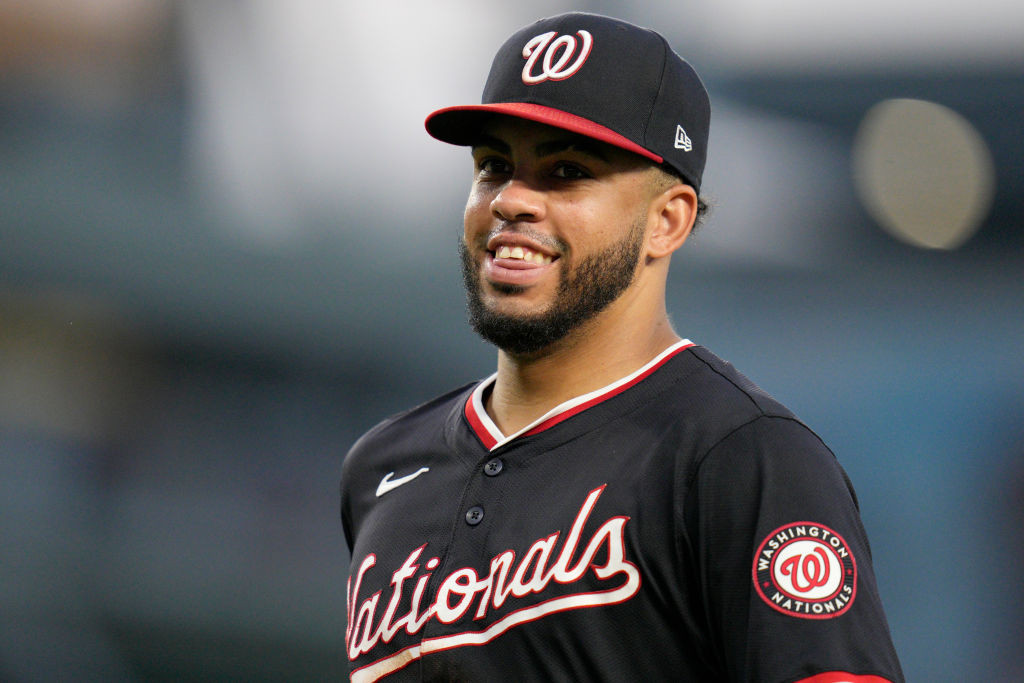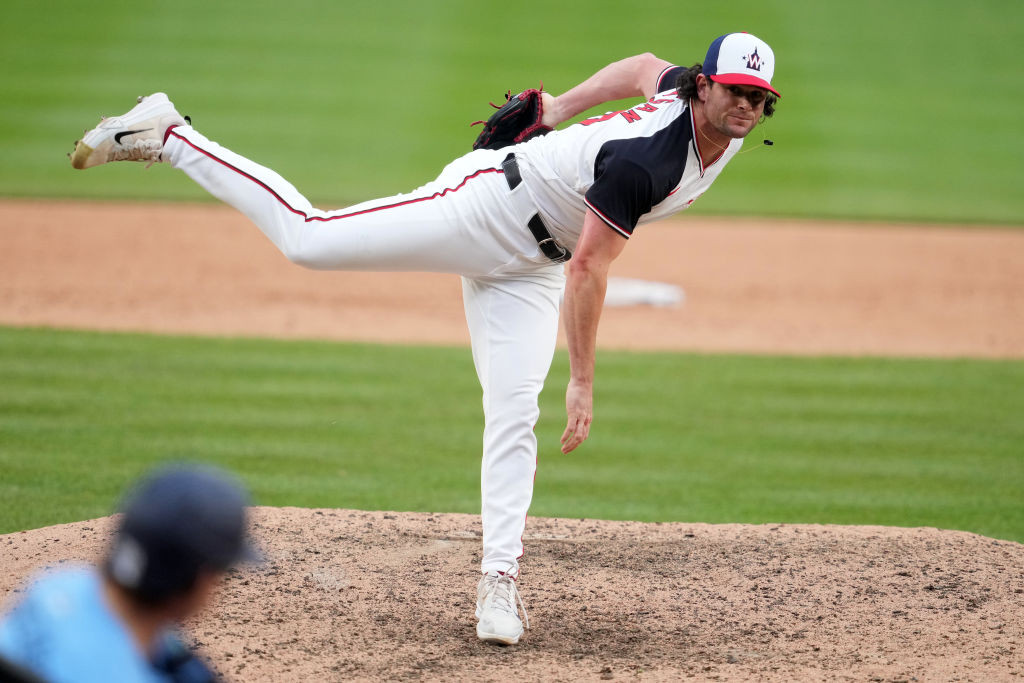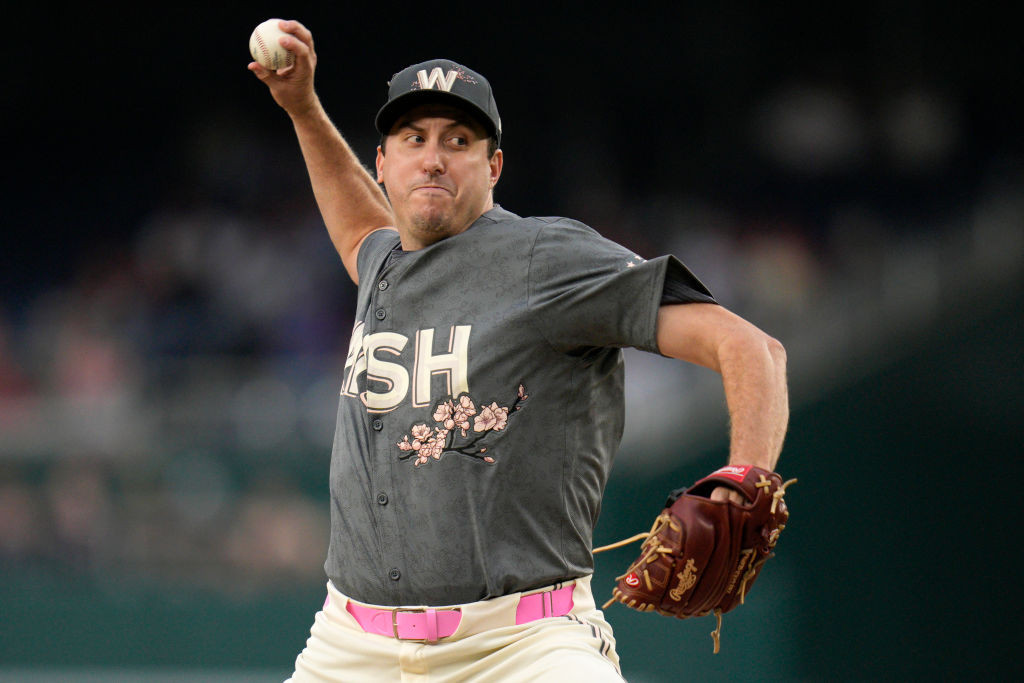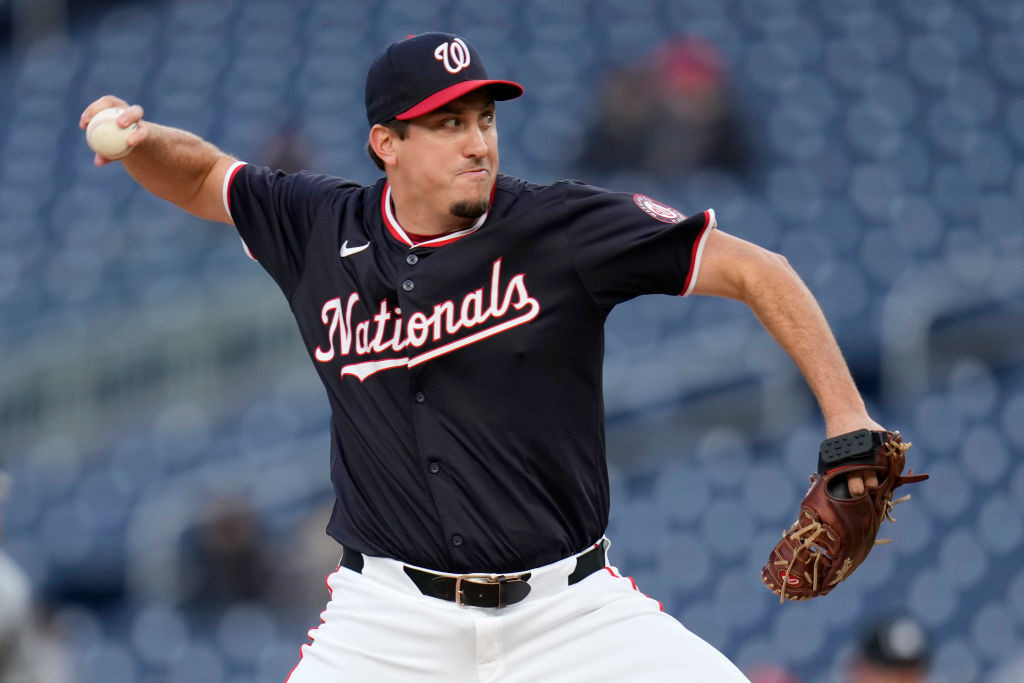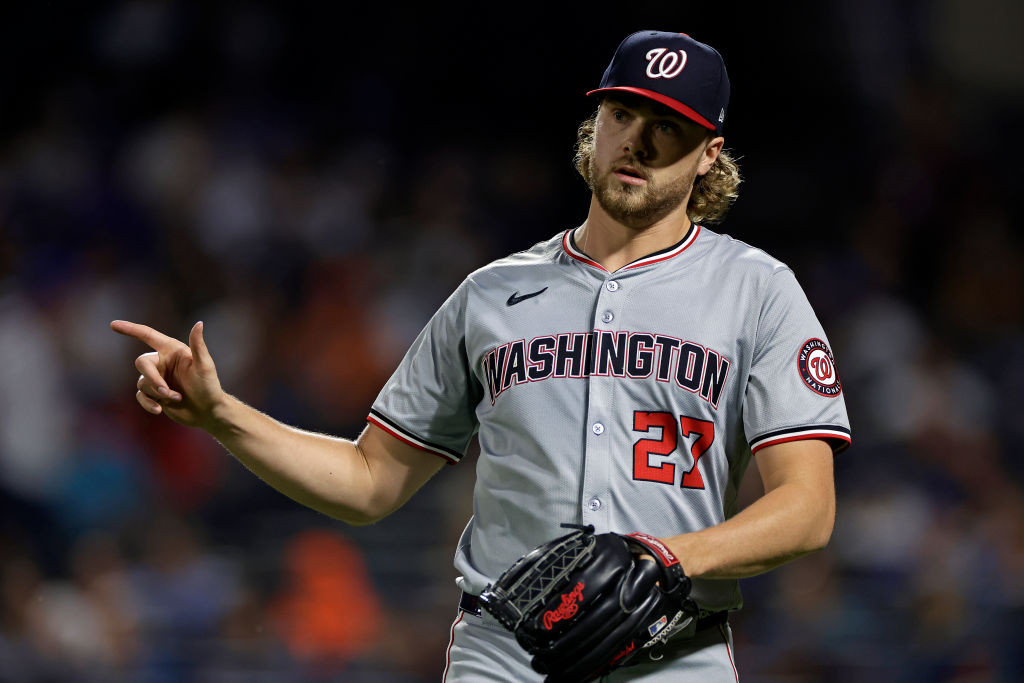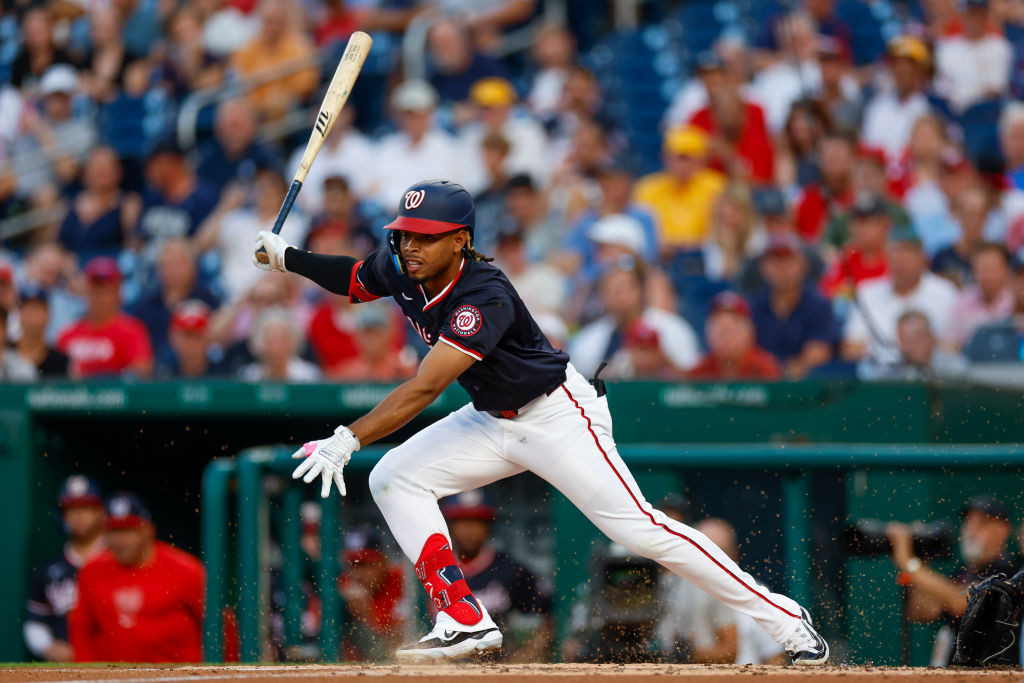Josh Bell will sit for the third straight game while dealing with a groin issue that kept him out of the lineup for the final two matchups in Cincinnati.
The Nationals designated hitter tweaked his right groin muscle running out a ground ball in the seventh inning of Friday night’s loss to the Reds. Manager Davey Martinez kept the 32-year-old out of the lineup for the final two games against the Reds as a precaution, especially due to the bad weather all weekend at Great American Ball Park.
But although Bell is feeling better, Martinez continues to practice caution, sitting him again for the opener against the Guardians, his former team.
“He's doing better. I'm being very cautious,” the skipper said during his pregame media session. “We have played in some bad weather. He's a big guy, so I want to make sure that he's OK. But he's definitely doing better. Yesterday he said he was a lot less sore than he was the day before, so that's good.”
Bell has struggled to start the season, hitting .139 with a .528 OPS in 30 games. Although, he is third on the team with five home runs and 14 RBIs. With him sidelined, Alex Call (and his .875 OPS) has the chance to play more, and is manning left field tonight while James Wood serves as the designated hitter.
PHILADELPHIA – Paul DeJong is recovering from surgery Monday to repair a broken nose, plus his sinuses and orbital bone, procedures that collectively are likely to keep the Nationals third baseman out until sometime around the All-Star break.
DeJong, who was hit in the face by a fastball from the Pirates’ Mitch Keller on April 15, had to wait nearly two weeks for swelling around his left eye to go down before the surgery could be performed. He and the Nationals knew all along he would need to have his broken nose repaired, but doctors also decided to work on his damaged sinuses and insert a titanium orbital plate near his eye, according to USA Today.
The 31-year-old infielder is recovering well at home in Northern Virginia and spoke today with manager Davey Martinez about the incident and his timeline for recovery.
“His spirits were good,” Martinez said. “He came out of it good. Joked around with him for a little bit. Unfortunately, he’s still going to be down for a while. I think they said about a month before he can do any activities. And after that, hopefully we get him back sometime around the All-Star break. But we’ll see. Only time will tell now.”
The Nationals’ biggest concern with DeJong now is more mental than physical. The bones will heal, but psychologically he could face a tough time standing in to face a big league pitcher again, given what happened.
Cade Cavalli took the mound for his second rehab start Thursday night while starting the season on the 15-day injured list and pitched to some very encouraging results.
Moved up to Double-A Harrisburg, the right-hander completed five scoreless innings with two hits, one walk and four strikeouts on an efficient 69 pitches, 43 of which were strikes.
“Very good. He threw the ball exceptionally well,” Nationals manager Davey Martinez said ahead of his team’s opener against the Mets. “I think his average velo was up to about 96 (mph). He threw the ball really well. Curveball was very good. He was trying to land it for strikes; he did that very well. So he's just building himself up. He's doing well.”
Cavalli’s first rehab start, as he continues to build his way back from March 2023 Tommy John surgery, came on April 19 with Single-A Fredericksburg. On that night, he completed four shutout innings with one hit, two walks, three strikeouts on 46 pitches, 29 strikes.
When asked where he would like to see Cavalli’s fastball velocity to be during these rehab starts, Martinez referenced the famous signs at last year’s spring training that hung in the bullpen and read, “I don’t care how fast you throw ball four.”
The Nationals can now start counting down the days until CJ Abrams returns to their lineup. But first, the All-Star shortstop needs to prove he’s good to go in a rehab assignment.
Abrams is playing tonight for Double-A Harrisburg, his first game action since aggravating his right hip flexor April 11 in Miami. He’s technically eligible to come off the 10-day injured list now, but the Nats wanted him to get some reps in the minor leagues before activating him.
“I’d like to get him on his feet, get him some at-bats and make sure he’s OK,” manager Davey Martinez said. “The last time he felt it was on the field, so we want to get him out there and let him play shortstop. And if it takes a day or two or three, then we’ll prepare for that. But hopefully he comes out today feeling good and not bothering him.”
Abrams is slated to play six innings at shortstop tonight and take at least three at-bats, with the possibility of more if he feels up for more. The Nationals would love to have him back in their lineup before the end of this week’s series against the Orioles, but they won’t rush it if he doesn’t look ready.
Nasim Nuñez has excelled in the field in Abrams’ place, to nobody’s surprise. But the 24-year-old infielder doesn’t provide nearly the offensive punch as the man ahead of him on the depth chart. In seven games since taking over as the everyday shortstop, Nunez is batting .182 (4-for-22) with three walks and two stolen bases.
CJ Abrams has his first day off of the young season, not because of a bad matchup or a planned respite, but because of a tight thigh muscle.
Nationals manager Davey Martinez said the shortstop felt his right thigh tighten up while making the final play of Sunday’s 5-4 win over the Diamondbacks. Abrams charged in to field Randal Grichuk’s broken-bat grounder in the top of the ninth, then threw on the run to first, nearly pulling Nathaniel Lowe off the bag.
“He feels a little bit better today,” Martinez said. “I just wanted to give him a day, to make sure this doesn’t become a big issue.”
Asked what level of concern he has about Abrams, Martinez replied: “Right now, none. Hopefully it could’ve just been a cramp. But I want to make sure that’s just what it is.”
Abrams not only had started all nine previous games this season, but had played every inning to date. Martinez’s choice of replacement may come as a bit of a surprise: Paul DeJong.
TORONTO – Keibert Ruiz is behind the plate for the Nationals tonight, his fourth straight start to begin the season.
As much as Davey Martinez suggested he might try to give his workhorse starting catcher a few more days off this year, Ruiz’s early production has not only kept him in the lineup. It has bumped him up the lineup.
After batting seventh in each of the Nats’ first two games against the Phillies, Ruiz moved up to the cleanup spot for Sunday’s series finale. And now he’s batting third tonight in the series opener against the Blue Jays.
“He’s getting a chance to hit third today,” Martinez said, not exactly committing to this look long-term. “I wanted to break up our lefties, because (the Blue Jays) do have three left-handed relievers in their bullpen. But he’s swinging the bat well.”
That’s an understatement. On the heels of a miserable 2024 in which he slashed .229/.260/.359, Ruiz homered in each of this season’s first two games, once from the left side of the plate, once from the right. He added another hit and scored two runs Sunday, leaving him 5-for-10 with a double, two homers, three RBIs and a 1.745 OPS to date.
DJ Herz is getting a second opinion on his sprained elbow ligament, one that will determine if the Nationals left-hander needs Tommy John surgery or can attempt to come back merely with rest and rehab.
Herz, who was placed on the 15-day injured list Tuesday and then transferred to the 60-day IL on Wednesday, already had an initial MRI taken that revealed a sprain of the ulnar collateral ligament. He’s now scheduled to get a second opinion in Dallas from Keith Meister, the noted orthopedist who has performed a number of Tommy John surgeries and internal brace procedures on other major leaguers. According to a source familiar with the injury, the Nationals don’t intend to wait long if surgery is suggested, preferring Herz get it done now and be able to return for the majority of the 2026 season.
Herz was one of the brightest developments of last season, debuting in June and proceeding to make 19 big league starts, going 4-9 with a 4.6 ERA but also authoring several of the team’s most dominant starts of the year. He came to camp this spring competing with Mitchell Parker and Shinnosuke Ogasawara for the fifth starter’s job but struggled with command and saw his fastball velocity drop into the upper 80s.
Herz told club officials and reporters alike he was physically fine, but that he wasn’t throwing as hard due to a lack of adrenaline. He cited similar situations playing out in previous spring trainings, noting his velocity always showed up during the regular season.
The Nationals saw some better signs during a simulated game Herz pitched late in camp, but still decided to option the lefty to Triple-A Rochester last week, giving him more time to build his arm up. After learning of the demotion, Herz informed the team he wanted to see a doctor in case there actually was something wrong with his arm.
PORT ST. LUCIE, Fla. – As the Mets kept fouling off everything MacKenzie Gore was throwing at them, driving up his pitch count and limiting him to only three innings in his spring training finale, you could only imagine the Nationals left-hander’s frustration mounting.
Then mention it to Gore, inform him of the gargantuan foul ball tally (24 of the 74 total pitches he threw) and watch his eyes actually light up.
“That’s probably a good thing, really,” he said. “Because I think everyone was kind of aware what was going on. I’m not going to get too caught up in location, trying to be perfect. I was going at them with heaters, and we did get a lot of foul balls, which is good. I thought it was good.”
What exactly was going on today during the Nats’ 5-5 exhibition tie at Clover Park? Gore, confident he was already ready for Opening Day and cognizant he’ll be facing the Mets plenty of times this season, opted to keep his pitching plan as basic as could be. He threw 47 fastballs, compared to only 13 curveballs, 12 changeups and two sliders.
If this game counted, he never would’ve done that, deploying much more deception in an attempt to induce way more than eight total whiffs from New York’s batters.
NORTH PORT, Fla. – Injuries are the last thing any player wants to experience at this stage of spring training, all the more so for any player battling for a spot on the Opening Day roster.
So when Andrés Chaparro had to be scratched from today’s lineup after experiencing some kind of discomfort during batting practice, the competition for the final spot on the Nationals’ bench may have had a wrench thrown into it.
Chaparro was set to bat fifth and start at first base for the Nats against the Braves, an opportunity for him to continue his torrid spring at the plate and further his case for that spot on the Opening Day roster. The 25-year-old is batting a robust .400 (12-for-30) with two doubles, a homer and five RBIs, though he has also run into several outs on the bases, much to the chagrin of the coaching staff.
Juan Yepez, who is also in the mix for that “26th man” job, will now start at first base in Chaparro’s place, with Stone Garrett taking over his spot in the lineup and serving as designated hitter.
Chaparro and Yepez have a similar player profile, with Yepez having an advantage because of his defensive versatility but a disadvantage because of his lower numbers this spring (6-for-27, one double). Also competing for the job are José Tena (who can play third base, shortstop and second base) and Nasim Nuñez (who excels in the field and on the bases and is batting .458 this spring).
WEST PALM BEACH, Fla. – For nearly a month, Derek Law has been at Nationals camp. He’s been in the clubhouse. He’s been on the practice fields. He’s been healthy. And until today he hadn’t participated in anything that resembled a game situation.
“I’ve been super antsy,” the reliever said. “These guys get here, and I’m just playing super-light catch, and these guys are ripping it like that. You just get the itch, because everybody’s having fun. You want to be a part of it. It almost feels like a rehab, but I’m not.”
Law isn’t rehabbing from any injury. He’s simply been on a pre-planned, delayed throwing program as the Nats attempt to get him ready for Opening Day without using up too many bullets in spring training.
One year after becoming the Nationals’ first reliever to total 90 innings since Tyler Clippard in 2010, three innings shy of Saul Rivera’s club record from 2007, Law is setting the bar high. He wants to be available anytime Davey Martinez needs him. Which means he wants to enter the season with a full tank, while still finding a way to adequately prepare.
So that meant sitting back and watching everyone else fully participate from day one of spring training while he waited for his time to come.
JUPITER, Fla. – The Nationals will be trying some new things this weekend as they continue to get their pitchers ready for the regular season.
For the most part, the starters are staying in the same rotation. There are just some tweaks as to how and where they’ll be getting their work done over the next couple of days.
The rotation following Michael Soroka’s start today against the Cardinals includes Trevor Williams starting tomorrow night against the Mets, with MacKenzie Gore and Kyle Finnegan pitching on the back fields at CACTI Park of the Palm Beaches. DJ Herz starts Saturday’s game against the Cardinals and Jake Irvin starts Sunday’s game against the Mets, with both matchups on MASN. And Shinnosuke Ogasawara will start one of Monday’s split-squad games against the Marlins.
Mitchell Parker is still day-to-day with a stiff neck after not pitching on his regularly scheduled day yesterday behind Ogasawara.
“Parker is still day-to-day,” manager Davey Martinez said during his pregame session with the media. “I want to make sure that we get this neck thing right before we send him back out.”
When the Nationals decided to non-tender All-Star closer Kyle Finnegan and Tanner Rainey on Nov. 22, they were letting go the only two relief pitchers on their roster who had real major league experience in high-leverage end-of-game situations.
After a spectacular start to the season with a 1.98 ERA and 23 saves on July 4, Finnegan struggled after his first All-Star selection. Over his final 28 appearances, he pitched to a 5.93 ERA with only 15 saves in 17 chances. Although he finished third in the major leagues with 38 saves, his overall 3.68 ERA was the third-highest among relievers with 26 or more saves.
Nonetheless, the Nats’ decision to part ways with Finnegan, who at 33 was projected to make $8.6 million in his last year of arbitration eligibility by MLB Trade Rumors, was unexpected.
The choice to non-tender Rainey, however, was less surprising. The 32-year-old right-hander was still trying to rediscover his form after August 2022 Tommy John surgery. Although he pitched to a 2.14 ERA and 1.000 WHIP over the season’s final two months, his overall numbers of 4.76 and 1.490 weren’t encouraging enough for the Nats to hold onto the last remaining player from their 2019 championship roster for one more year.
So the Nats entered the thick of the Hot Stove Season in need of a closer. And here we are two days away from pitchers and catchers reporting to West Palm Beach where the question still stands: Who’s the closer?
There are 57 players set to report to Nationals spring training in the next week-plus, 28 of them position players, 29 of them pitchers. That number is a little smaller than in some previous years, but it probably underscores the likelihood of several more free agent signings during these final days of the offseason, or even during the first few weeks of camp.
For now, though, this is your team. Only 26 of them will head north at the end of March and make the Opening Day roster. Obviously, some of them are in far better position to make the club than others, but everyone will get a chance to play in front of the big league coaching staff and front office in West Palm Beach, Fla., and make a case for himself.
You know most of these guys, but you probably don’t know all of them. So with that in mind, let’s run through the entire camp roster, with some quick thoughts on each entering the spring. We did position players yesterday, so today’s let’s run through the pitchers …
DAISON ACOSTA, RHP
The 26-year-old reliever joined the Nats organization last season and put up some impressive numbers at Double-A Harrisburg (2.89 ERA, 1.189 WHIP, 73 strikeouts in 53 innings). He got a non-roster invitation to camp this spring, where he’ll have a chance to prove if his stuff works against big league hitters.
JOAN ADON, RHP
Despite being designated for assignment this winter, the righty is still here, having cleared waivers and been outrighted off the 40-man roster. It would take a lot for him to earn his way back to the majors at this point, though.
Yesterday, we looked at the Nationals’ projected position players and tried to decide if they figure to get better, worse or the same production from each spot this year as they got last year. While the overall outlook for a top-tier lineup doesn’t exactly look great, it does appear to be better in most spots, including a few key positions.
Now, what about the pitching staff? It’s probably not fair to run this exercise yet, because there are still several significant holes to fill in the bullpen. But we don’t know when (or if) that will happen for certain, so all we can do is evaluate the state of things in their current form.
What’s the outlook? Is the 2025 Nats pitching staff likely to be better, worse or the same as it was in 2024? …
NO. 1 STARTER: Slightly better, maybe much better
We don’t know at this point who the Opening Day starter will be, but let’s say it’s MacKenzie Gore. He had the lowest ERA (3.91) and the most strikeouts (181) on the staff last season while also tying for the team lead in wins (10). Is that as good as the left-hander is going to get? The feeling here is no. Gore has long been touted as a frontline big league starter, and while we’ve seen stretches of that from him, we’re still waiting for him to put it all together over a full year. Here’s why he may be ready to make that leap: While he was excellent in his 10 wins last season (1.98 ERA), he was considerably better in his 12 losses (5.37 ERA) than he was the previous year (7.71 ERA). We know Gore is outstanding when he’s at his best. The key for him now is to just be OK when he’s not at his best, not letting starts blow up on him. He showed improvement in that area last season, and there’s reason to believe he can continue to get better this season.
NO. 2 STARTER: Same, maybe better
Jake Irvin was one of the most positive developments of the 2024 season, with 10 wins, 187 2/3 innings pitched and a strong 1.199 WHIP. Like Gore, he was really good when he was at his best (1.61 ERA in wins, 2.59 ERA in no-decisions) but really bad when he wasn’t at his best (8.28 ERA in 14 losses). Can he reduce the number of those bad starts, or at least pitch a bit better in those games? If he can, Irvin has a chance to be better overall this season. Even if he doesn’t, he can be a solid workhorse for this team.
It’s arbitration deadline day across Major League Baseball, the day when hundreds of players either agree with their clubs on 2025 salaries or file for arbitration.
The decisions made today don’t change the contractual status of any player. All are already under club control and don’t have the ability to leave. Teams can’t decide now to release them, having already announced plans to tender them contracts in November. The only thing determined today (or later, if cases go to arbitration) is the players’ salary figures for the upcoming season.
And yet, the way this day proceeds often tells us a lot about the relationship between players and teams, and whether the two sides value each other in a comparable way or not.
Who’s impacted by this deadline? It’s anyone with at least three years but fewer than six years of big league service time, plus the top 22 percent of players with at least two years of service time (the so-called “Super-2” players).
The Nationals entered the offseason with nine arbitration-eligible players: Kyle Finnegan, Luis Garcia Jr., Josiah Gray, Derek Law, MacKenzie Gore, Riley Adams, Ildemaro Vargas, Tanner Rainey and Mason Thompson. Finnegan and Rainey, however, were non-tendered, and Vargas was cut loose as well, bringing the number down to six.
Twenty-four hours ago, the Nationals’ most pressing roster needs appeared obvious. They needed a power-hitting first baseman. They needed a veteran starting pitcher. They needed an experienced reliever or two for a setup role. And maybe they needed another productive offensive player who could either hold or share the DH role with someone else.
And then just like that, they added another pressing need to the list: a closer.
Friday night’s unexpected decision not to tender a contract to Kyle Finnegan – fellow reliever Tanner Rainey also was non-tendered – created a major void in the Nats bullpen. Maybe Finnegan wasn’t an elite lockdown closer, but he ranked second in the National League in saves this season and over his five seasons in D.C. totaled 88 saves and 291 appearances, third-most in club history in each category.
Manager Davey Martinez’s remaining relief options boast nothing close to that kind of resume.
Derek Law, who was tendered a contract before Friday’s deadline, is a durable and reliable reliever, to be sure. But the 34-year-old has notched only 13 big league saves across parts of eight seasons with six different clubs. His value lies in his ability to take the ball as often as his manager needs him, which led to a whopping 75 appearances and 90 innings pitched this season. He actually pitches more regularly than a typical closer does.
Most of the attention this time of year – and, really, most of the offseason – is on big names. Sluggers. Starting pitchers. Free agents seeking multi-year deals, hopefully helping transform franchises in the process.
But there’s never been a Hot Stove League that ultimately wasn’t filled with dozens of relievers joining new clubs. And very often, those seemingly lower-profile moves prove to be just as important as the big-ticket ones.
The Nationals almost always are involved in this market, and there’s every reason to believe they once again will be involved this winter. (Or, perhaps, this spring.)
Mike Rizzo added a host of experienced relievers prior to the 2024 season, and many of those guys were signed not in November, December or January, but rather in February, even after pitchers and catchers reported for camp. Only one bullpen arm was signed prior to Feb. 1: Dylan Floro, who also got the only major league contract of the eventual bunch, for a modest $2.25 million.
Then came a flurry of minor league signings as camp was beginning. Richard Bleier and Robert Gsellman on Feb. 2. Luis Perdomo on Feb. 8. Jacob Barnes on Feb. 16. Derek Law on Feb. 22. Matt Barnes on Feb. 27.
PLAYER REVIEW: DEREK LAW
Age on Opening Day 2025: 34
How acquired: Signed as minor league free agent, February 2024
MLB service time: 5 years, 81 days
2024 salary: $1.5 million
NEW YORK – These Nationals don’t know what postseason baseball feels like, and they won’t be finding out in 2024. They do want to experience it in 2025, though, at minimum the pressure of a September pennant race where the outcome of each game only magnifies down the stretch.
So consider the final two weeks of this season a dress rehearsal for the youngest team in the majors, with 13 games left on the schedule, all of them against teams still in the race. And the first set of games in this closing stretch – against the Mets at Citi Field – may have the most pressure-packed feeling of the bunch.
So how did the Nats handle it all in tonight’s series opener? They didn’t appear to be overwhelmed by the situation most of the night, certainly not Jake Irvin, who authored yet another gem against the Mets. But they could not deliver the one hit or the one pitch they needed with the game on the line late, and that’s why New York ultimately was celebrating a 2-1 10-inning win at the center of the diamond, a crowd of 21,694 roaring as the home team retook the final Wild Card position in the National League from the Braves.
"It's tough," manager Davey Martinez said. "(Irvin) threw the ball really well. I thought today was probably the best day I've seen him throw the ball. ... He gave us everything we needed. We just couldn't get those couple runs he needed."
Starling Marte won it with a line drive single to left off Jacob Barnes, the Nationals’ fourth pitcher of the night. Tasked with stranding the Mets’ automatic runner after his teammates couldn’t score theirs in the top of the 10th, Barnes got Francisco Alvarez to fly out to right for one out, though that allowed Harrison Bader to advance to third. Barnes then left a 3-1 fastball over the plate to Marte, who lined the ball into left field and was mobbed by his teammates as the Nats trudged off the field.
A Nationals club that has owned the Marlins this season looked ready to keep that trend going tonight when it stormed out to a quick three-run lead against an unheralded opposing starter while watching its own starter cruise along for six innings barely breaking a sweat along the way.
It’s not quite that simple to win ballgames in the major leagues, of course, no matter the quality of opponent. You still need to pitch well for nine innings, hit for more than one inning and play clean defense all night.
And the Nats did none of those things during what wound up a disheartening 6-3 loss to Miami.
Despite an at-times dominant start from Mitchell Parker and the aforementioned early three-run lead, the Nationals fell flat the rest of the way. They didn’t score again after the bottom of the first. They committed three errors, two of them directly leading to three unearned runs. And they didn’t get the outs they needed from Derek Law during a decisive top of the eighth that flipped the score in the Marlins’ favor.
All of which added up to only their second loss in 10 head-to-head games this season against the last-place Marlins, this one played before a sparse crowd of 13,299 on Thursday night in September.




-1745819772711.png)
